Comment maîtriser la gestion de la réputation personnelle en 2025 ? 6 étapes
Table des matières
Rihanna est une vraie reine ! Même lorsqu'elle ne sort pas de nouvelle musique, les gens parlent beaucoup d'elle. Au cours des 30 derniers jours, elle a reçu 36k mentions et a généré une portée de plus de 854 M. Le meilleur ? La plupart des mention sont positifs (plus de 8,5k) et quelques-uns seulement sont négatifs (moins de 1k). Vous souhaitez obtenir des résultats similaires ? Voici votre guide de la gestion de la réputation personnelle !
Résumé rapide :
- La gestion de la réputation personnelle est le processus qui consiste à façonner et à contrôler consciemment l'image d'une personne en ligne.
- Ce processus implique la gestion de votre empreinte numérique, qui comprend tout ce que vous publiez et ce que les autres publient à votre sujet en ligne.
- Vous pouvez gérer votre réputation personnelle à l'aide de l'écoute sociale. Il permet d'analyser et de surveiller en permanence les mention en ligne, y compris les contenus en ligne négatifs, et de les analyser en termes de sentiment, de portée, d'influence, etc.
Qu'est-ce que la gestion de la réputation personnelle ?
La gestion de la réputation personnelle est le processus qui consiste à contrôler et à façonner l'image d'une personne en ligne.
Il s'agit de surveiller les informations qui apparaissent en ligne, de réagir aux contenus défavorables et de construire une image positive par le biais de diverses actions conscientes.
Gérez votre réputation personnelle !
Quel type d'actions ?
Les efforts de gestion de la réputation en ligne peuvent inclure
- Publier un contenu de qualité
- S'occuper des profils professionnels sur les médias sociaux
- Participer activement à la vie numérique.
L'objectif est d'accroître la crédibilité, la confiance et la notoriété d'une personne. visibilité en lignedans un contexte professionnel et personnel.
Pourquoi est-ce important ?
Votre marque personnelle peut avoir un impact sur vous à différents niveaux :
- En matière de recrutementles employeurs consultent souvent les profils des candidats en ligne.
- Dans la vie personnelle et professionnelle, réputation numérique affecte la confiance et la crédibilité perçue.
- Pour les experts et les indépendantsLa création d'une marque personnelle en ligne détermine souvent les missions et les collaborations.
- Dans le cadre privéElle a un impact considérable sur la vie privée et la sécurité numériques.
Une bonne réputation en ligne fonctionne un peu comme un passeport numérique.
Il ouvre la voie à de nouvelles opportunités, inspire confiance à la frontière de chaque interaction et prouve votre identité avant même que vous ne disiez quoi que ce soit.
Donc, si vous me posez la question, oui, la réputation personnelle est très importante.
Savez-vous comment vous êtes perçu en ligne ?
Voyons comment maintenir une présence en ligne forte et une réputation en ligne positive !
Voici ce que je propose de faire :
Stratégie de gestion de la réputation personnelle
01 Surveillance de plusieurs canaux
Pour une gestion efficace de la réputation personnelle, il est essentiel de surveiller tous les canaux en ligne disponibles.
Pourquoi ?
C'est là que se forme l'image publique, souvent... à votre insu ou sans votre contrôle.
Les internautes peuvent rechercher votre nom non seulement sur Google, mais aussi sur d'autres moteurs de recherche ou plateformes. Il est donc important de gérer votre réputation dans toutes les sources possibles.
Les commentaires, les opinions ou les mention apparaissant à divers endroits sur le web peuvent influencer la façon dont nous sommes perçus par nos collègues, nos clients, nos fans ou les recruteurs.
N'oubliez pas que chaque canal a une fonction, un public et une dynamique de réaction différents.
Il est donc utile de surveiller un éventail aussi large que possible d'espaces numériques pour s'assurer que votre vie privée est bien protégée. gestion de la réputation en ligne est efficace.
Contrôlez votre réputation personnelle sur différents canaux !
Voici ce qu'il en est pour Rihanna :
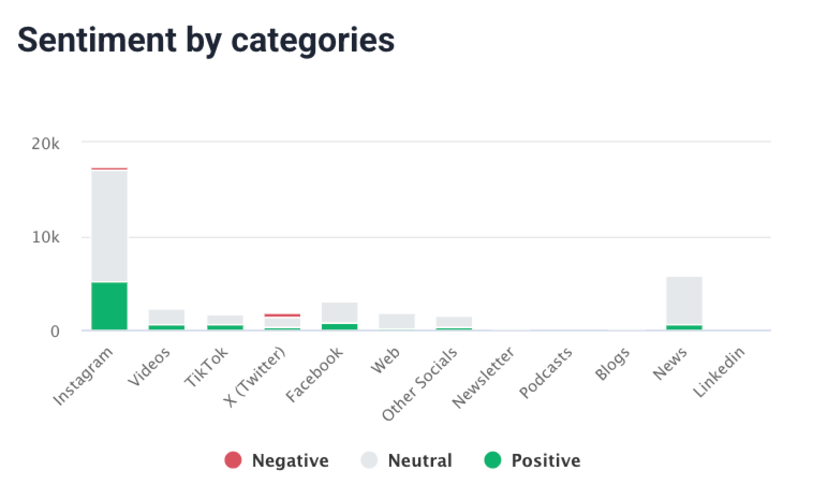
Comme vous pouvez le constater, les plateformes de médias sociaux jouent un rôle crucial pour elle. Mais cela ne veut pas dire qu'il en sera de même pour vous !
Sachez où l'on parle le plus de vous !
Différents canaux peuvent être essentiels en fonction de votre profession.
Si vous êtes un étudiant à la recherche d'un nouvel emploi ou un PDG d'une entreprise de niche, vous devriez vous concentrer sur X ou LinkedIn, car ce sont les principales plateformes pour la construction d'une image professionnelle, le réseautage et le partage des connaissances.

Mais pour la politique, ce sera très probablement X (Twitter), car c'est là que les opinions sont exprimées et que les gens réagissent à l'actualité.
Pourquoi surveiller différents canaux ?
- Des publics différents utilisent des plateformes différentes - ce qui est remarqué sur Twitter peut échapper à LinkedIn.
- Réagir rapidement à des contenus défavorables ou à des "fake news" contribue à limiter sa portée et son impact.
- La construction d'une image positive nécessite de la constance dans tous les lieux où nous sommes présents.
- Savoir repérer les opportunités pour l'autopromotion, la collaboration, les partenariats ou l'établissement de relations.
Gérez votre réputation personnelle !
02 Suivre et analyser le sentiment
L'étape cruciale suivante consiste à effectuer une analyse des sentiments.
Vous devez surveiller l'évolution du sentiment au fil du temps et déterminer si des actions spécifiques ont provoqué des hausses et des baisses de votre réputation personnelle.
Voici ce qu'il en est pour Rihanna au cours des 30 derniers jours :

Vous pouvez accéder à un tel graphique dans la rubrique Onglet Analyse > Sentiment.
Vérifiez le sentiment autour de votre nom !
Pour connaître l'impact des changements, j'aime utiliser les fonctions d'intelligence artificielle.
Par exemple, je peux demander au <strong>Assistant de marque AI</strong> sur les sujets qui génèrent le plus de négativité à l'égard de Rihanna.
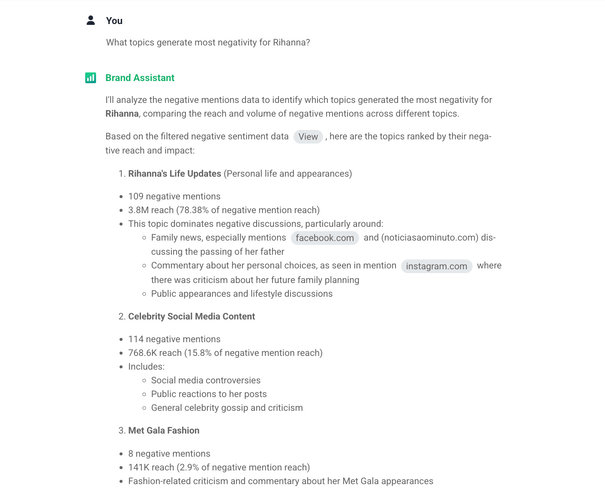
C'est un excellent outil pour la gestion de la réputation en ligne. Il permet de repérer plus facilement les failles dans la réputation.
Accéder à l'assistant de marque AI !
Enfin, vous devez vous concentrer sur les canaux qui apportent le plus de vos mention négatifs.
Comment les trouver ? Vous pouvez vous rendre sur le site Tableau de bord Brand24 > Analyse des métriques.
Pour Rihanna, la source la plus négative est X.
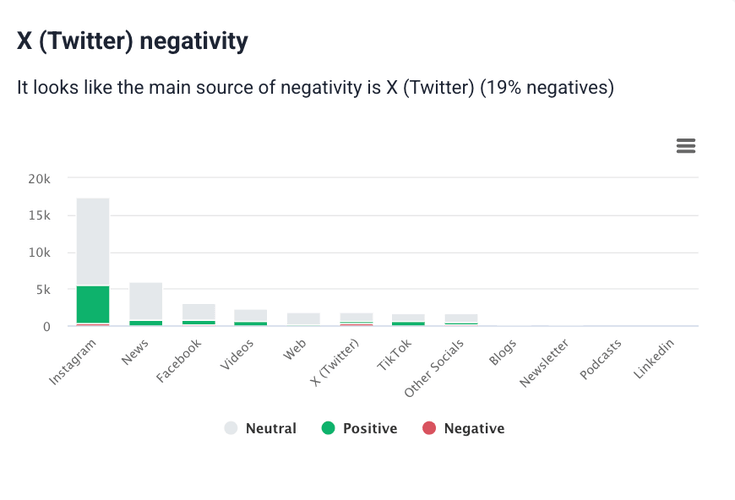
La réputation en ligne n'est pas seulement ce que nous disons de nous-mêmes, mais surtout ce que les autres disent de nous - et où ils le disent.
Sachez où les gens vous détestent !
Plus le nombre de canaux couverts par la surveillance est important, mieux vous maîtrisez votre image de marque.
03 Contrôler les médias sociaux
Le contrôle des médias sociaux joue un rôle clé dans la gestion de la réputation personnelle en ligne, car c'est là que l'image d'un individu peut être construite... ou brisée - littéralement en quelques minutes.
Les plateformes de médias sociaux sont extrêmement dynamiques, le contenu se propage de manière virale et toute controverse, tout faux pas ou tout malentendu peut rapidement dégénérer en "drames".
C'est pourquoi le suivi de l'activité et des mention sur les réseaux sociaux devrait être une priorité pour toute personne soucieuse de son image et désireuse de maintenir une présence positive en ligne.
De plus, les médias sociaux sont un espace où les utilisateurs se sentent plus anonymes, ce qui favorise le chahut, le trolling et les critiques non constructives.
La capacité à répondre à de tels phénomènes, avec classe, calme et cohérence, est cruciale.
Trouvez des mention qui valent la peine de répondre !
Les principes de base de l'hygiène de la réputation en ligne consistent à ignorer les contenus toxiques, à bloquer les trolls persistants, à être ouvert à un dialogue de fond et à clarifier les malentendus.
Mais il est parfois difficile de se frayer un chemin dans l'océan des mention des médias sociaux.
💡 Mon conseil est d'utiliser l'IA pour trouver les plus importants et de se concentrer sur ceux-ci en premier lieu.
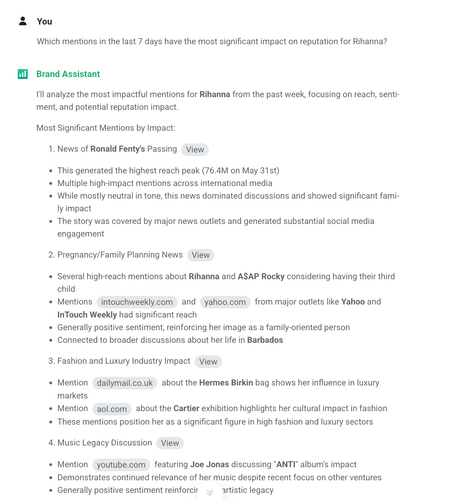
04 Mettre en place un système d'alerte précoce
Plus vous identifiez rapidement une crise potentielle, plus vous avez de chances de la gérer avant qu'elle ne devienne incontrôlable.
Moderne outils de suivi des médiasLes systèmes d'alerte, tels que Brand24, offrent des alertes automatiques en temps réel qui vous informent lorsque le nombre de mention de votre nom augmente.
Recevez des alertes lorsque quelqu'un parle de vous !
Ces alertes sont envoyées par courrier électronique ou par notification mobile, ce qui vous permet de.. :
- Prendre des mesures immédiates - publier une déclaration, répondre aux allégations, clarifier la situation.
- Réorienter la communication - inviter à des contacts privés, étouffer les conflits dans l'œuf.
- Impliquer l'équipe des relations publiques si la question a une portée plus large.
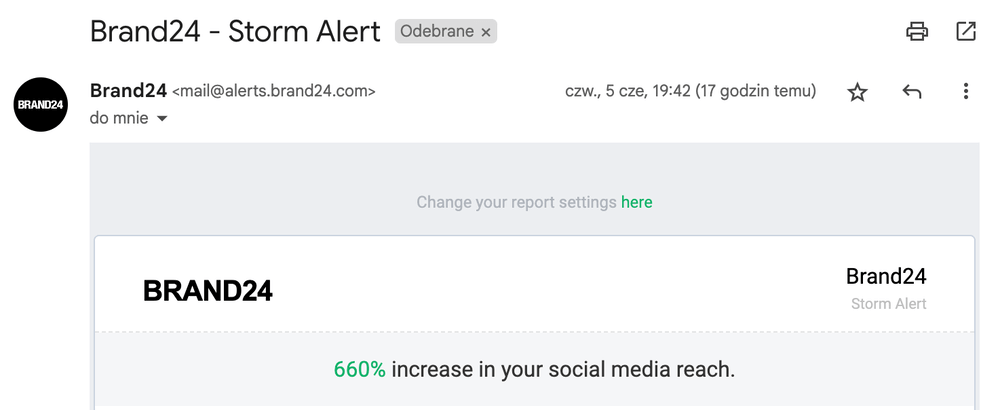
Les alertes sont complétées par une fonction intéressante, à savoir la fonction Détecteur d'événements IA.
Il identifie automatiquement ce qui est à l'origine d'un pic dans le nombre de mention. Ainsi, non seulement vous voyez qu'il se passe quelque chose, mais vous savez immédiatement de quoi il s'agit.
Comment cela fonctionne-t-il ?
Lorsqu'une anomalie est détectée (telle qu'une augmentation soudaine du nombre de mention), l'outil l'indique :
- Quels sont les mention qui ont déclenché le pic ?
- Quelle est la plateforme qui suscite le plus d'intérêt ?
- Que s'est-il potentiellement passé ?
Connaître les raisons des changements de réputation !
Vous pouvez rapidement identifier la source du problème - par exemple, un article défavorable, un message controversé, un commentaire d'un influenceur.
Voici à quoi cela ressemble :

05 Réfléchissez toujours à deux fois avant de publier
La plupart des crises de relations publiques n'auraient pas pu se produire si quelqu'un avait réfléchi à un résultat potentiel.
Par conséquent, avant de publier un contenu (surtout s'il est un peu controversé), veillez à définir comment les autres peuvent interpréter la situation.
Votre réputation personnelle est-elle menacée ?
N'oubliez pas que le fait de partager des aspects de votre vie personnelle en ligne peut avoir une influence considérable sur votre réputation, alors réfléchissez bien aux détails personnels que vous rendez publics.
Le message peut-il être facilement mal compris ?
C'est peut-être l'occasion de le réécrire et de sauver votre réputation personnelle en ligne !
Gérez votre réputation personnelle !
06 Se concentrer sur la construction d'une réputation positive
La gestion de la réputation personnelle en ligne est un processus continu, mais il peut être beaucoup plus facile lorsque vous avez une réputation en ligne globalement positive.
Dans la mesure du possible, privilégiez la prévention et la création d'une bonne image en ligne.
Alors, pour vous faciliter la tâche.
Voici une liste de petits conseils pour une bonne réputation personnelle :
- Vérifiez ce que l'algorithme du moteur de recherche affiche lorsque votre nom est tapé.
- Passez en revue vos anciennes publications sur les médias sociaux - il est parfois judicieux de supprimer quelque chose ou de limiter la visibilité.
- N'entrez pas dans des discussions. Répondez en nature, poliment, ou ne répondez pas du tout - le silence peut aussi être une stratégie.
- Utilisez la même version de votre nom/nom d'utilisateur sur toutes les plateformes - cela augmente la reconnaissance.
- Publiez du contenu positif et utile (même une fois par mois !).
- Soyez actif là où se trouve votre public cible.
- Remerciez ou partagez lorsque quelqu'un vous marque positivement
Créez une bonne image personnelle en ligne !
Conclusion
La maîtrise de la gestion de la réputation personnelle n'est pas seulement un atout.
C'est essentiel dans un monde où votre réputation personnelle fait souvent la première impression et détermine ce qui apparaît dans les résultats de recherche sous votre nom.
Réflexions finales :
- Le moyen le plus simple de gérer sa réputation personnelle est de rester proactif : surveillez votre nom sur plusieurs canaux, suivez l'évolution des sentiments et réagissez rapidement à tout pic de négativité.
- Utilisation Outils d'écoute sociale de l'IA comme Brand24 pour la gestion de la réputation personnelle en ligne. Ils vous donnent une longueur d'avance grâce à des alertes en temps réel et à une analyse des sentiments alimentée par l'IA, pour que vous restiez toujours sur la bonne voie.
- La règle d'or ? Réfléchir avant de poster. De nombreuses crises de relations publiques peuvent être évitées en s'arrêtant simplement et en se posant la question : Comment cela peut-il être perçu ? En cas de doute, reformulez, clarifiez ou ne publiez pas du tout.
- Réputation dans les médias sociaux peut être votre plus grand atout ou votre plus grand handicap. Restez cohérent, répondez avec élégance et concentrez votre énergie sur un engagement utile plutôt que sur des histoires sur Internet.
Prêt à prendre le contrôle de votre image en ligne ? Démarrer un Brand24 essai gratuit et accédez aux mêmes outils de gestion de la réputation que ceux utilisés par les marques mondiales et les personnalités publiques !
Articles connexes


![Comment protéger votre réputation en ligne ? 5 étapes [2025]](https://brand24.com/blog/app/uploads/2024/05/Protecting-Online-Reputation-600x335.webp)

![9 étapes pour une stratégie de notoriété forte [2025]](https://brand24.com/blog/app/uploads/2020/12/15-The-ultimate-guide-to-brand-awareness-1400x660x2.png)
![Réputation de la marque : Stratégie, Conseils et Guide [2025]](https://brand24.com/blog/app/uploads/2024/05/brand_reputation-600x335.webp)